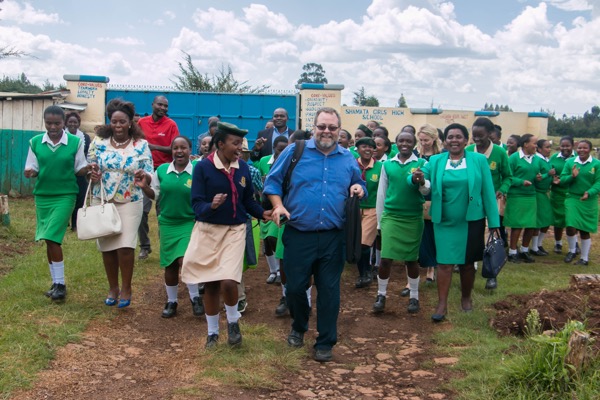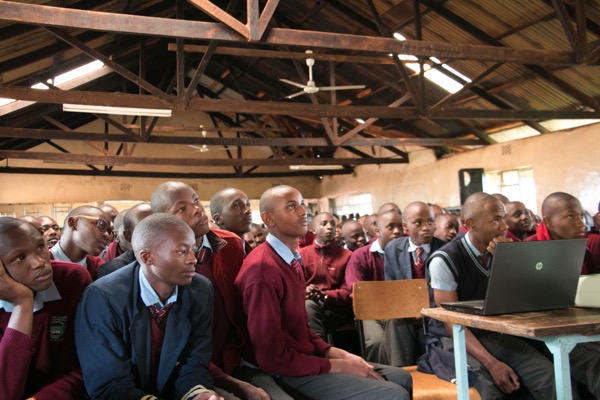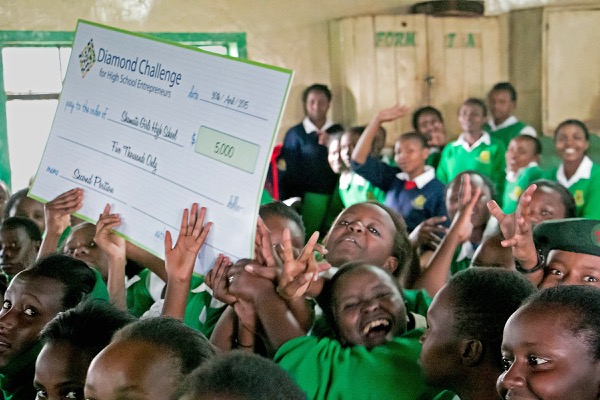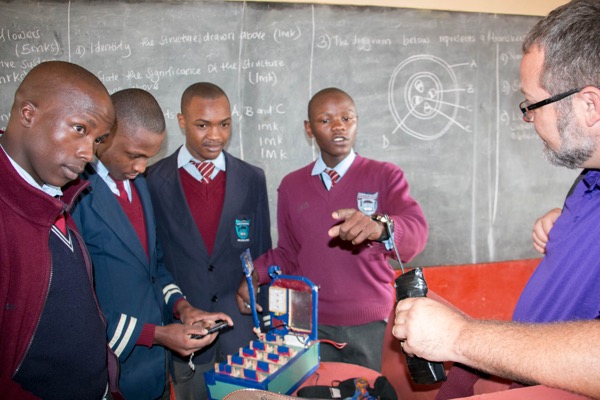Kenya's future innovators
Horn Program staff members travel to Kenya to support young entrepreneurs
1:24 p.m., Aug. 17, 2015--Following in the wake of President Barack Obama’s recent visit to Kenya for the Global Entrepreneurship Summit (GES), Dan Freeman and Julie Frieswyk from the University of Delaware’s Horn Program in Entrepreneurship visited Kenya where they work in partnership with Wilmington-based StartupAfrica to provide educational opportunities and encourage youth entrepreneurship there and in other East African nations.
Erastus Mong’are, executive director of StartupAfrica, hosted program director Freeman and program coordinator Frieswyk in their travels to four counties throughout Kenya to visit students who participated in the Horn Program’s Diamond Challenge for High School Entrepreneurs.
Global Stories
Fulbright awards
Peace Corps plans
There they learned about the students’ exciting projects in areas like energy, security, agriculture and marketing, and saw firsthand how these projects are producing positive tangible benefits in their lives and communities.
“When we created the Diamond Challenge, I knew it would make a big difference,” Freeman said. “But I had no idea about the incredible magnitude of its impact.”
Mong’are agreed, noting that having the Horn team in Kenya made a big difference to the participating teachers. “They got to understand exactly what the Diamond Challenge is and why entrepreneurship is important, not just for them as teachers but also for their students."
The impact is particularly evident in Kenya’s Nyandarua County, home to a team of young women from Shamata Girls School who won the second place prize in the 2015 Diamond Challenge, which concluded in April.
Jackline Ndungu, Elizabeth Ngure, Margaret Gitau, Margaret Njunguna and team adviser David Njogu created a concept to solve the agribusiness problem of low profits leading to food shortages and slow economic growth. The Shamata team designed viable methods for processing crops like potatoes into more valuable food products like potato flour.
After this concept captured the Diamond Challenge prize in 2015, Nyandura County embraced it and has provided support to the winning team in various capacities. This year, the team presented their idea at the Global Economic Expo (the expo paired with the GES), and they are continuing to build on the initial project.
Nyandura County was also the chosen location for a teacher training session that Freeman and Frieswyk led in collaboration with StartUP Africa during their visit. The training included over 130 teachers from five Kenyan counties.
Based on feedback Mong'are received following the training, the teachers were delighted with the results. "Teachers reached out to us just to say thank you and express their gratitude for the training, saying how beneficial it was for them to understand exactly what the initiative is about, and how they are now prepared to best assist their students going forward."
“There is a huge thirst for entrepreneurship education in Kenya,” said Frieswyk. “Community leaders, politicians and teachers connect it to hope for their youth.”
Another winning idea came from Kenya’s Kiambu County, where students from Mangu Boys High School developed a product that converts human waste into energy.
Brian Mwangi, Michael Wahome, Stephen Otieno and Steve Gitahi collaborated to find an alternative to the area’s most commonly used energy source, a charcoal that is made from indigenous trees when cut contributes to deforestation.
The team’s idea for Huma-Coal, long-burning processed pellets made from human waste, captured last year’s Social Impact Prize at the Diamond Challenge. The students are continuing to pursue the project as a business, reporting that they cannot make enough to match customer demand.
A team of Mangu School students including Mwangi, Victor Otieno Omondi Paul, Mongo Andrew Caezer and Daniel Kioko Kitheka were second place winners in the 2013 Diamond Challenge, receiving a $750 award for their school. The school put this prize to good use, purchasing beehives to allow students to sell honey. They have realized over $4,000 in profit from this initial investment.
Freeman and Frieswyk also visited students from Kahetti High School in Nyeri County, whose idea for a security system designed to help solve the country’s recent problems with violent attacks from extremist religious organizations.
Samuel Warui, Bevan Wambugu, Walace Kahiga, Eliud Ole Galisho and team adviser Penina Waigwa created a prototype of this system, which has the potential to detect guns and other security threats on public transportation addresses a serious problem facing Kenyans today.
Traveling on to Kiambu County, the Horn Program team met with Alliance Boys High School students Boniface and Ismael. Their team created a marketing app that allows Kenyans to compare prices of trustworthy local stores, a useful tool that addresses the problem of crowded public transportation which limits customers’ ability to shop around.
Boniface also attended the Global Entrepreneurship Expo where the group from Shamata School presented. While at the expo, Boniface found funding for the app’s concept. He is now working to build out the app with his new partners and investors.
Freeman and Frieswyk, who have been working with StartupAfrica for three years to promote youth entrepreneurship and employment in Kenya, said that these talented students are a testament to the importance of demystifying the process of nurturing entrepreneurial ideas.
“The momentum that you gain just by taking the first step to put your idea into action is tremendous,” Freeman said. “Everyone has ideas, but few put them into action. The Diamond Challenge provides a sense of empowerment by showing you how to do something with your ideas. It’s expanding opportunity and hope.”
The success of these students, Freeman continued, also demonstrates the positive impact of developing hands-on entrepreneurial skills.
“Students are longing for experiential learning and practical opportunities,” Freeman said.
The Diamond Challenge has brought those opportunities to them in a way that they’ve never seen before,” Frieswyk said. “It makes their learning real, understanding how what they do in school applies to the world.”
Mong'are believes that the trip not only provided much-needed entrepreneurship education and opportunities in Kenya, but has also positively impacted the StartUP Africa-Horn Program partnership.
He said, "The relationship has grown and strengthened with this trip. Many people just do projects for the sake of doing them. But the Horn Program team has engaged whenever we reached out to them, and they have been receptive in listening to our ideas. I'm elated that the relationship, if anything, is stronger and I hope that it continues to grow so that together we can do much more, not just in Delaware but also in Africa."
To see more photos from the Kenya trip, check out this Flickr album.
Article by Sunny Rosen
Video and photos courtesy of the Horn Program














